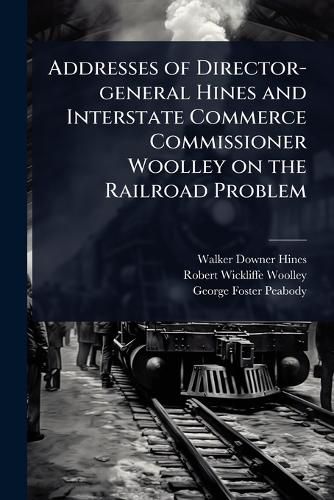Readings Newsletter
Become a Readings Member to make your shopping experience even easier.
Sign in or sign up for free!
You’re not far away from qualifying for FREE standard shipping within Australia
You’ve qualified for FREE standard shipping within Australia
The cart is loading…






This title is printed to order. This book may have been self-published. If so, we cannot guarantee the quality of the content. In the main most books will have gone through the editing process however some may not. We therefore suggest that you be aware of this before ordering this book. If in doubt check either the author or publisher’s details as we are unable to accept any returns unless they are faulty. Please contact us if you have any questions.
This volume presents addresses by Walker Downer Hines, then Director-General of Railroads, and Interstate Commerce Commissioner Robert Wickliffe Woolley, concerning the pressing a??Railroad Problema?? of the early 20th century. Delivered at a time when the role of railroads was critical to the nationa?(TM)s economy and infrastructure, these speeches offer insight into the debates and policies surrounding railroad regulation and operation following World War I.
Hines, a prominent lawyer and government official, provides a detailed analysis of the challenges facing the railroad industry and proposes solutions for its efficient and equitable management. Woolley, drawing on his experience as an Interstate Commerce Commissioner, offers a complementary perspective on the regulatory framework necessary to ensure fair competition and public service. George Foster Peabody contributes additional context and commentary.
This collection is invaluable for understanding the complexities of transportation policy and the economic considerations that shaped the American railroad system. These addresses remain relevant for students and researchers interested in the history of American railroads, regulatory policy, and economic development.
This work has been selected by scholars as being culturally important, and is part of the knowledge base of civilization as we know it. This work was reproduced from the original artifact, and remains as true to the original work as possible. Therefore, you will see the original copyright references, library stamps (as most of these works have been housed in our most important libraries around the world), and other notations in the work.
This work is in the public domain in the United States of America, and possibly other nations. Within the United States, you may freely copy and distribute this work, as no entity (individual or corporate) has a copyright on the body of the work.
As a reproduction of a historical artifact, this work may contain missing or blurred pages, poor pictures, errant marks, etc. Scholars believe, and we concur, that this work is important enough to be preserved, reproduced, and made generally available to the public. We appreciate your support of the preservation process, and thank you for being an important part of keeping this knowledge alive and relevant.
$9.00 standard shipping within Australia
FREE standard shipping within Australia for orders over $100.00
Express & International shipping calculated at checkout
Stock availability can be subject to change without notice. We recommend calling the shop or contacting our online team to check availability of low stock items. Please see our Shopping Online page for more details.
This title is printed to order. This book may have been self-published. If so, we cannot guarantee the quality of the content. In the main most books will have gone through the editing process however some may not. We therefore suggest that you be aware of this before ordering this book. If in doubt check either the author or publisher’s details as we are unable to accept any returns unless they are faulty. Please contact us if you have any questions.
This volume presents addresses by Walker Downer Hines, then Director-General of Railroads, and Interstate Commerce Commissioner Robert Wickliffe Woolley, concerning the pressing a??Railroad Problema?? of the early 20th century. Delivered at a time when the role of railroads was critical to the nationa?(TM)s economy and infrastructure, these speeches offer insight into the debates and policies surrounding railroad regulation and operation following World War I.
Hines, a prominent lawyer and government official, provides a detailed analysis of the challenges facing the railroad industry and proposes solutions for its efficient and equitable management. Woolley, drawing on his experience as an Interstate Commerce Commissioner, offers a complementary perspective on the regulatory framework necessary to ensure fair competition and public service. George Foster Peabody contributes additional context and commentary.
This collection is invaluable for understanding the complexities of transportation policy and the economic considerations that shaped the American railroad system. These addresses remain relevant for students and researchers interested in the history of American railroads, regulatory policy, and economic development.
This work has been selected by scholars as being culturally important, and is part of the knowledge base of civilization as we know it. This work was reproduced from the original artifact, and remains as true to the original work as possible. Therefore, you will see the original copyright references, library stamps (as most of these works have been housed in our most important libraries around the world), and other notations in the work.
This work is in the public domain in the United States of America, and possibly other nations. Within the United States, you may freely copy and distribute this work, as no entity (individual or corporate) has a copyright on the body of the work.
As a reproduction of a historical artifact, this work may contain missing or blurred pages, poor pictures, errant marks, etc. Scholars believe, and we concur, that this work is important enough to be preserved, reproduced, and made generally available to the public. We appreciate your support of the preservation process, and thank you for being an important part of keeping this knowledge alive and relevant.